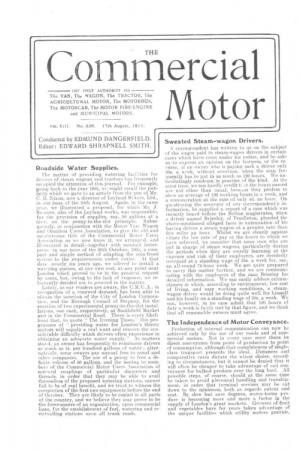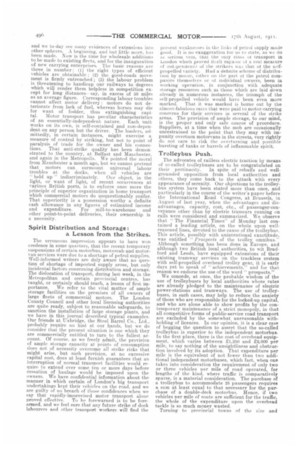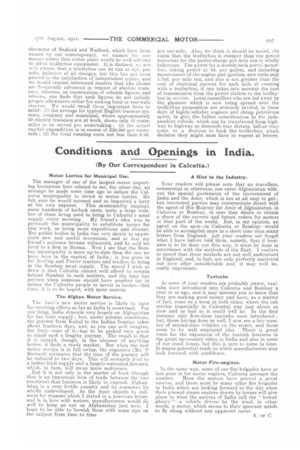Roadside Water Supplies.
Page 1

Page 2

Page 3

If you've noticed an error in this article please click here to report it so we can fix it.
The matter of providing watering facilities for drivers of steam wagons and tractors has frequently occupied the attention of this journal. For example, going back to the year 1905, we might recall the publicity which we gave to an article from Ow pen of Mr. C. B. Nixon, now a director of Leyland Motors, Ltd., in our issue of the 24th August. Again, in the same year, we illustrated a proposal, for which Mr. J. Sumner, also of the Leyland works, was responsible, for the provision of supplies, say, 50 gallons at a time, on the penny-in-the-slot principle. Subsequently, in conjunction with the Motor Van. Wagon and Omnibus Users Association, to give the old and cundiersome title of the Commercial Motor Users Association as we now know it, we arranged, and illustrated in detail—together with succinct letterpri:ss---in our issue of the 20th October, 1905, a compact and simple method of adapting the coin-freed system to the requirements under notice. At that date nearly six years ago, we offered to install a watering station, at our own cost, at any point near London which proved to be in the greatest request by users, but, owing to the lack of response, we reluctantly decided not to proceed in the matter.
Lately, as our readers are aware, the C.M.U.A., in recognition of a renewed demand, has been able to obtain the sanction of the City of London Corporation, and the 'Borough Council of Stepney, for the erection of two experimental penny-in-the-slot installations, one each, respectively, at Smithfield Market and in the Commercial Road. There is every likeli hood that, to quote " The Evening Times," tins pro gramme of " providing water for London's thirsty motors will supply a real want and remove the considerable difficulty which drivers often experience in obtaining an adequate water supply." As matters stand, an owner has frequently to reimburse drivers as much as Is. per hundred gallons of water ; alternatively, some owners pay annual fees to canal and other companies. The use of a penny to free a definite volume of 50 gallons, and the issuing to members of the Commercial Motor Users Association of screwed couplings of particular diameters and threads, in order that they may be able to avail themselves of the proposed watering stations, cannot fail to be of real benefit, and we trust to witness the completion of the first two equipments before the end of October. They are likely to be copied in all parts of the country, and we believe they may prove to be the forerunners of an organization, upon commercial lines, for the establishment of fuel, watering and revictualling stations upon all trunk roads.
Sweated Steam-wagon Drivers.
A correspondent has written to us on the subject of the wages paid to steam-wagon drivers in certain cases which have come under his notice, and he asks us to express an opinion on the fairness, or the reverse, of an owner who is paying such a driver only 30s. a meek, without overtime, when the man frequently has to put in as much as 120 hours. We unhesitatingly condemn in practice of the kind. At the same time, we can hardly credit ti at the hours named are not other than usual, because they profess to show an average of 120 working hours in a week, and a remuneration at the rate of only 4d. an hour. On questioning the accuracy of our correspondent's information, he supplied a report of a case which was recently beard before the Bolton magistrates, when a driver named Brierley, of Pendleton, pleaded the above-mentioned alleged facts in extenuation of his having driven a steam wagon at a greater rate than five miles an hour. Whilst we are clearly against either the low rate of pay or the hours to which we have referred, we consider that sonic men who are put in charge of steam wagons, particularly during the periods when they are merely learning at the expense and risk of their employers, are decidedly overpaid at a standing wage of 35s. a week for, say, an all-round 72-hour week. We are quite prepared to carry this matter further, and we are communicating with the employers of the man Brierley for detailed information. A\ c can easily adduce circumstances in which, according to environment, low cost. of living, and easy working conditions, a steamwagon driver would be doing quite well for himself and his family on a standing wage of 30s. a week. We can, however, in no case admit that 120 hours of duty a week is fairly met by that figure, and we think that all reasonable owners must agree.
The Independence of Motor Conveyance.
Perfection of internal communication can now be achieved only by the use of our roads and of commercial motors. Not in every case must there be direct conveyance from point of production to point of consumption, although that completeness of singleclass transport presents the ideal. Distances and comparative rates dictate the wisest choice, according to circumstances, but it cannot be denied that it will often be cheaper to take advantage of rail conveyance for bulked produce over the long haul. All possible steps, of course, should at the same time be taken to avoid piecemeal-handling and transhipment, in order that terminal services may be cut down to the minimum, both as regards extent and cost. By slow but sure degrees, motor-borne produce is becoming more and more a factor in the supply of London's great markets. Growers of fruit and vegetables have for years taken advantage of the unique facilities which utility motors provide, and we to-day see many evidences of extensions into other spheres. A beginning, and but little more, has been made. Now is the time for wholesale additions to be made to existing fleets, and for the inauguration of new carrying enterprises. The basic reasons are three in number : (I) the right types of efficient vehicles are obtainable ; (2) the good-roads movement is firmly entrenched ; (3) the labour problem is threatening to handicap our railways to degrees which will render them helpless in competition except for long distancessay, in excess of 50 miles as an average figure, Corresponding labour troubles cannot affect motor delivery : motors do not deteriorate from lack of fuel, whereas horses may die for want of fodder, thus extinguishing capi tal. Motor transport has peculiar characteristics of an essentially-independent nature. Each 'unit works on its own, is self-contained and non-dependent on any person but the driver. The loaders, admittedly, in certain instances, might exercise a measure of control by striking, but not to point of paralysis of trade for the owner and his connections. That anti-strike quality has been demonstrated to the country, at, Belfast. and Manchester, and again in the Metropolis. We pointed the moral from Manchester a month ago, but we cannot pretend that motors can surmount universal labour troubles at the docks, when all vehicles are " held up " indiscriminately. Our object, in the light, or want of light, of recent occurrences at various British ports, is to enforce once more the principle of superior organization in home transport which commercial motors do unquestionably confer. That superiority is a possession worthy a definite cash allowance in any figures of estimated income and expenditure. For mill-to-warehouse and other point-to-point deliveries, their ownership is a necessity.
Spirit Distribution and Storage : a Lesson from the Strikes.
The erroneous impression appears to have won credence in some quarters, that the recent temporary suspensions of certain motorbus, motorcab and motorvan services were due to a shortage of petrol supplies. Well-informed writers are duly aware that no question of shortage of imported supply arose, but only incidental factors concerning distribution and storage. The dislocation of transport, during last week, in the Metropolitan and certain provincial centres, has taught, or certainly should teach, a lesson of first importance. We refer to the vital matter of ample storage facilities on the premises of all owners of large fleets of commercial motors. The London County Council and other local licensing authorities are quite ready, subject to reasonable safeguards, to sanction the installation of large storage plants, and we have in this journal described typical examples. Our friends at Uxbridge, the Steel Barrel Co., Ltd., probably require no hint at our hands, but we do consider that the present situation is one which they are commercially entitled to turn to the fullest account. Of course, as we freely admit, the provision of ample storage capacity at points of consumption does not of necessity overcome all strike risks that might arise, but such provision, at no excessive capital cost, does at least furnish guarantees that an interruption of normal transport facilities would require to extend over some ten or more days before cessation of haulage would be imposed upon the owners. We have confidential information about the manner in which certain of London's big transport undertakings kept their vehicles on the road, and we are guilty of no breach of those confidences when we say that rapidly-imnrovised motor transport alone proved effective. To be forewarned is to be forearmed, and we feel sure that any future strike of dock labourers and other transport workerswill find the pre,eilt weaknesses in the links of petrol supply made good. It is no exaggeration for us to state, as we do In serious vein, that the only class ut transport in London which proved itselt capanie ot a real measure of mcivennerica of the strikers wa.; that of the selfpropelled variety. Had a definite scheme of distribution by motor, either on the part ot the petrol companies themselves or of individual owners, been in working operation, in conjunction with adequate storage resources such as those which are laid down already in numerous instances, the triumph of the selt-propelled vehicle would have been even more marked. That it was marked is borne out by the almost-fabulous rates that were paid to motor-carrying concerns for their services in several of the strike areas. The provision of ample storage, to our mind, is the proper and only safe course of procedure. Suppliers, at a time when the mob are occasionally unrestrained to the point that they may with impunity overturn motorvans in the streets, very rightly do not care to risk the overturning and possible bursting of tanks or barrels of inflammable spirit.
Trolleybus Push.
The advocates of railless electric traction by means of so-called. trolleybuses are to be congratulated on their pertinacity. In spite of rebuffs and wellgrounded opposition from local authorities and others, they come back to the attack with every appearance of serenity. Our objections to the trolleybus system have been stated more than once, and particularly in the course of the writer's paper before the International Road Congress, at Brussels, in August. of last year, when the advantages and disadvantages, capacity, cost, etc., of passenger-conveyance other than by electric tramcars running on rails were considered and summarized. We observe that "The Financial Times" of Monday last contained a leading article, on the whole upon wellreasoned lines, devoted to the cause of the trolleybus. This article, possibly with unintentional exactitude, was entitled " Prospects of the trolley omnibus." Although something has been done in Europe, and although two British local authorities, to wit Bradford and Leeds, have equipped extensions of their existing tramway services on the trackless system with self-propelled overhead trolley gear, it is early days yet to speak of " achievements," and for that reason we endorse the use of the word " prospects." We concede, at once, the probable wisdom of the use of trolleybuses by local authorities whose rates are already pledged to the maintenance of electric power-stations and tramways. The use of trolleybuses, in such cases, may help to reduce. the anxiety of those who are responsible for the locked-up, capital, and who are alone able to show profits by the contemporary maintenance of a strict monopoly, in that all competitive forms of public-service road transport are excluded by the somewhat unreasonable withholding of licences. In our opinion, it is a clear case of begging the question to assertthat the so-called trolleybus is superior to the independent motorbus. In the first place, there is the cost of overhead equipment, which varies between 21,250 and 22,000 per mile, to say nothing of the unsightliness and, obstruction involved by its adoption. That expenditure per mile is the equivalent of not fewer than two additional independent motorbuses, which fact, when one takes into consideration the requirement of only two or three vehicles tier mite .of road operated, for lengths of the kind, where traffic is comparatively sparse, is a material consideration. The purchase of a trolleybus to accommodate 28 passengers requires a sum at least eoual to that necessary for the purchase of a double-deck motorbus. Hence, if two vehicles ner mile of route are sufficient for the traffic, the whole of the expenditure upon the overhead tackle is so much money wasted.
Turning to provincial towns of the size and character of Bedford and Watford, which have been named by our contemporary, we cannot for one minute admit that either place would be well advised to select trolleybus equipment. It is claimed, i% c are well aware, that a trolleybus can be run at 6!,d. per mile, inclusive of all charges, but this has put been proved to the satisfaction of independent critics, and we would remind interested readers that like claims are frequently advanced in respect of electric tramcars, whereas, on examination of reliable figuies and returns, one finds that such figures do not include proper allowances either for sinking fund or renewals reserve. We would recall these important facts to mind : (1) the average for typical English tramcar systems, company and municipal, where approximately 50 electric tramcars are at work, shows only 12 routemiles to be served per undertaking; (2) the actual capital expenditure is in excess of £20,000 per routemile ; (3) the total running costs not less than 9.5d. per car-mile. Also, we think it should be noted, the claim that the trolleybus is cheaper •than the petrol motorbus for the power-charge per mile run is wholly fallacious. The power for a double-deck petrol motorbus, taking petrol at sd. per gallon, and including maintenance of the engine and ignition, now costs only 1.75d. per mile run, and this is not greater than the cost of electrical current for each mile of running with a trolleybus, if one takes into account the cost of transmission from the power station to the trolleybus in service. Local councillors who are led away by the glamour which is now being spread over the trolleybus proposition are seriously invited, in these days of highly-reliable engines and cheap petroleum spirit, to give the fullest consideration to the independent vehicle, which can be transferred from highway to highway as demands may dictate, before they com.e. to a decision to back the trollevbus, which decision they might soon have to repent at leisure.




















